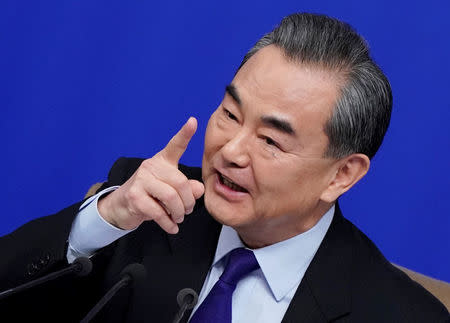China makes 'silver fox' top diplomat, promoted to state councillor

By Christian Shepherd
BEIJING (Reuters) - China appointed Foreign Minister Wang Yi on Monday as one of its five state councillors, giving him the country's top diplomatic post in a vote of confidence for his strong defence of China's interests amid a host of overseas challenges.
State Councillors, who report to the Cabinet, are more senior than ministers and it is unusual, though not unprecedented, for an individual to hold both positions.
Wang's elevation was approved by China's largely rubber stamp parliament in a vote on Monday.
Wang, 64, has been China's foreign minister since 2013. A career diplomat and fluent Japanese speaker, he has also served as China's ambassador in Tokyo and head of China's policy-making Taiwan Affairs Office.
Likened to a "silver fox" by China's state media and online admirers, due to his looks and his diplomatic wiles, Wang is regarded as suave and charming, but tough, by foreign diplomats.
Unusually friendly to the foreign media for a senior Chinese official, Wang has won plaudits in China for his tough line on issues like the disputed South China Sea and quick-witted - sometimes bad-tempered quips - to counter criticism of China.
Sources had previously told Reuters that Wang would probably become a state councillor with responsibility for diplomacy, while also keeping his job as foreign minister.
His promotion comes as relations with the United States sour over trade disputes and U.S. support for self-ruled Taiwan, and as China hopes to ensure talks with unpredictable and nuclear-capable North Korea get back on track.
In his new role, Wang will continue to advise and inform top leaders to help implement President Xi Jinping's vision to raise China's diplomatic profile globally, according to Shi Yinhong, an expert on Chinese diplomacy at Renmin University in Beijing, who has advised the government on diplomatic issues.
However, his promotion does not mean that he will lead China's foreign policy, Shi added: "Ultimately his role will still be secondary".
FORMER TOP DIPLOMAT RETAINS INFLUENTIAL ROLE
Yang Jiechi, the man Wang replaces as state councillor, remains on Politburo, the second-largest of the Communist Party's elite ruling bodies, meaning he will still have an influential voice in foreign policy.
Yang, 67, also retains his seat as secretary general of the Foreign Affairs Leading Group, chaired by Xi, which is a top party body for directing and coordinating Chinese diplomacy.
"Everyone knows that comrade Yang Jiechi is a member of the Politburo. We believe he will continue to play an important role in China's diplomacy," Foreign Ministry Spokeswoman Hua Chunying told a regular daily briefing, without elaborating.
The party is ultimately responsible for all government decisions and where real power lies. Wang is not a Politburo member but is on the Central Committee, the largest of the party's decision-making bodies and a rung below the Politburo.
Diplomatic sources had speculated that Yang was in the running to become a vice premier, but his name was not included in the list for that position.
Previously China's foreign minister himself, Yang speaks perfect English but has a low-key public profile and rarely talks to foreign reporters.
Yang has served as one of China's main go-betweens with the Trump administration, with his deep knowledge of the United States coming from previous stints in the Chinese embassy in Washington, including as ambassador from 2000-2004.
Newly-appointed Vice President Wang Qishan, a key ally of President Xi Jinping, is likely to be tasked with handling the Trump administration and festering trade tensions with the United States.
Wei Fenghe, who already sits on the Central Military Commission which runs China's armed forces, received a double promotion to become both a state councillor and defence minister.
The defence minister is more of a figurehead position, as ultimate power rests with Xi and the Central Military Commission. Wei is the fourth-ranked member of that seven-man body.
(Additional reporting by Zhang Shu and Ben Blanchard; Editing by Simon Cameron-Moore)

 Yahoo News
Yahoo News 